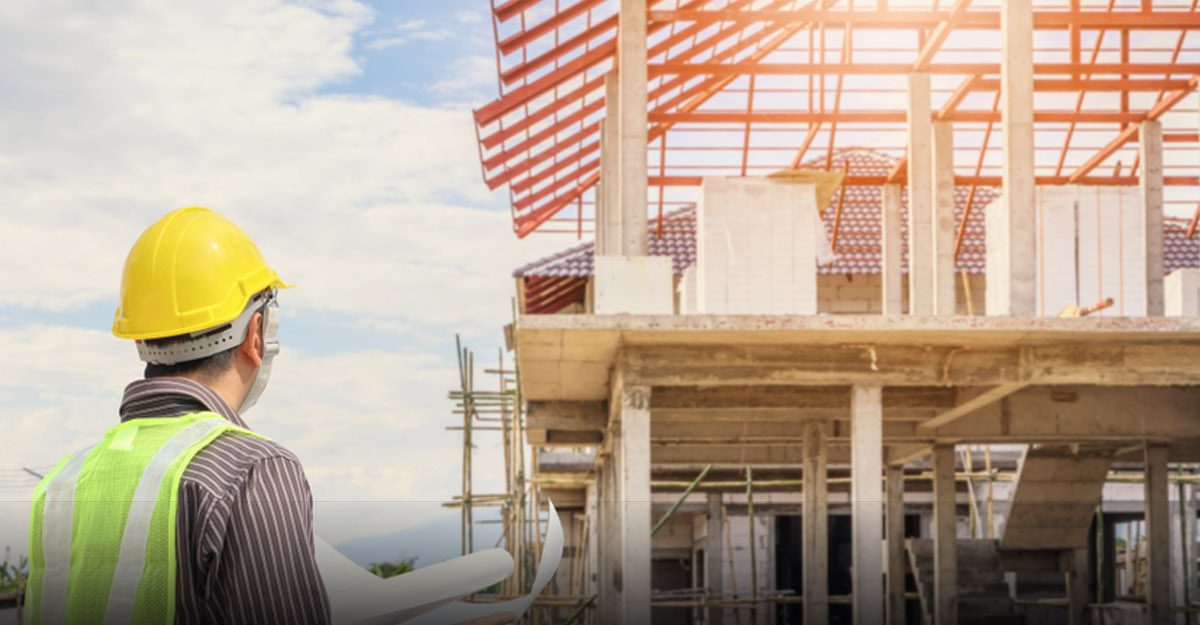Home>diy>Building & Construction>What Are General Conditions Of A Construction Contract


Building & Construction
What Are General Conditions Of A Construction Contract
Modified: March 6, 2024
Learn about the general conditions of a construction contract, including important aspects of building-construction agreements. Ensure a smooth project with clear terms and guidelines.
(Many of the links in this article redirect to a specific reviewed product. Your purchase of these products through affiliate links helps to generate commission for Storables.com, at no extra cost. Learn more)
Introduction
When embarking on a construction project, it is important to have a comprehensive understanding of the general conditions of a construction contract. These conditions lay the foundation for the agreement between the owner and the contractor, outlining the rights, obligations, and expectations of each party involved.
General conditions typically form a significant portion of the construction contract and set the framework for how the project will be executed. From defining the scope of work to establishing the payment terms and dispute resolution mechanisms, these conditions play a crucial role in ensuring a smooth and successful construction process.
It is essential for all parties involved, including owners, contractors, and subcontractors, to be well-versed in the general conditions of the construction contract. This knowledge provides clarity and helps avoid misunderstandings or potential disputes down the line.
In this article, we will dive into the key components that make up the general conditions of a construction contract. By understanding these aspects, you will be better equipped to navigate the intricacies of the contract and facilitate a successful construction project.
Key Takeaways:
- Construction contracts outline project details, payment terms, and dispute resolution. Clear communication and understanding of these conditions are crucial for a successful construction project.
- Site conditions, permits, and warranties are key components of construction contracts. They ensure transparency, accountability, and quality in construction projects.
Read more: What Is A Construction Contract
Scope of Work
The scope of work is a fundamental component of any construction contract. It outlines the specific tasks and responsibilities that the contractor is expected to perform and deliver during the course of the project.
When defining the scope of work, it is crucial to be thorough and precise. This helps ensure that both the owner and the contractor have a clear understanding of the project’s requirements and objectives.
The scope of work typically includes a detailed description of the construction project, including architectural and engineering drawings, specifications, and any other relevant documents. It may outline the size and dimensions of the project, the materials and equipment to be used, and any specific techniques or methodologies that must be employed.
It is important to note that the scope of work should be flexible enough to accommodate any necessary revisions or changes that may arise during the construction process. This can be achieved through a well-defined change order process, which allows for modifications to the scope of work while maintaining transparency and accountability.
By clearly defining the scope of work in the construction contract, both the owner and the contractor can establish a solid foundation for the project. This helps minimize the potential for misunderstandings or disputes and facilitates a smoother and more efficient construction process.
Construction Schedule
A well-planned construction schedule is vital to the successful completion of any construction project. It serves as a roadmap, outlining the sequence of activities and the expected timeframe for each phase of the project.
The construction schedule typically includes key milestones and deadlines, such as the start and end dates of the project, as well as intermediate deadlines for specific tasks or deliverables. It allows all parties involved to have a clear understanding of the project timeline and helps ensure that work progresses in a timely manner.
Creating a realistic and achievable construction schedule requires careful consideration of various factors, such as the scope of work, the availability of labor and resources, and the potential risks or challenges that may arise during the project.
It is crucial for both the owner and the contractor to collaborate in developing the construction schedule. This allows for input from all stakeholders and ensures that the schedule aligns with the project’s objectives and constraints.
Regular monitoring and updates of the construction schedule are essential to keep the project on track. This helps identify any delays or potential issues early on, allowing for proactive measures to be taken to mitigate them.
A well-managed construction schedule not only helps keep the project on time but also facilitates effective resource allocation, cost control, and coordination among various subcontractors and suppliers.
By including a detailed construction schedule in the construction contract, all parties involved can work cohesively towards a shared goal, maximizing the chances of a successful and timely project completion.
Site Conditions
Understanding the site conditions is crucial in the planning and execution of a construction project. Site conditions refer to the physical characteristics and environmental factors that can affect the construction process, including soil conditions, access to utilities, and the presence of any hazardous materials.
Prior to commencing the project, it is important to conduct a thorough site assessment and document the existing conditions. This assessment may include soil testing, topographic surveys, and environmental studies to identify any potential challenges or risks.
The construction contract should clearly define the responsibilities of the owner and the contractor regarding the site conditions. It may outline who is responsible for addressing any unforeseen site conditions that may arise during the course of the project.
In some cases, the contract may include provisions for site investigations or exploratory work before finalizing the project scope or pricing. This helps mitigate any potential risks or uncertainties related to the site conditions.
By addressing site conditions in the construction contract, both the owner and the contractor can minimize the potential for disputes or delays arising from unforeseen circumstances. It allows for proper planning and allocation of resources, ensuring a more efficient and smooth construction process.
If any significant changes in the site conditions occur during the construction process, it is important to follow the agreed-upon change order process to address the impact on the project timeline and budget.
Considering and addressing site conditions in the construction contract ensures that all parties are aware of the potential challenges and responsibilities associated with the project. This fosters transparency and collaboration, setting the stage for a successful construction project.
Permits and Approvals
Obtaining the necessary permits and approvals is a critical step in any construction project. These permits and approvals are typically required by local government authorities and regulatory bodies to ensure that the construction project complies with building codes, safety regulations, and environmental standards.
The construction contract should clearly outline the responsibility of obtaining permits and approvals, specifying whether it falls on the owner, the contractor, or a combination of both parties. It is important to accurately identify the specific permits and approvals required for the project and ensure that they are obtained in a timely manner.
The permit and approval process often involves submitting applications, providing supporting documentation, and potentially undergoing inspections or reviews. It is crucial to allocate sufficient time and resources for this process, as delays in obtaining permits and approvals can significantly impact the project schedule.
In some cases, the construction contract may include provisions for the owner to provide necessary documentation or information to support the permit application, while the contractor may be responsible for coordinating with regulatory authorities and overseeing the approval process.
By explicitly addressing permits and approvals in the construction contract, both the owner and the contractor are aware of their respective obligations and can work together to ensure compliance. This helps mitigate the risk of penalties or project delays due to non-compliance with regulatory requirements.
Additionally, it is important to consider the potential for permit-related changes or modifications during the course of the project. If any changes to the permit requirements occur, it is essential to follow the agreed-upon change order process to address the impact on the project scope, timeline, and budget.
Proper documentation and record-keeping of permits and approvals are also crucial for legal compliance and transparency purposes. These documents serve as evidence that the necessary regulatory requirements have been met, providing assurance to all parties involved.
By including a comprehensive discussion of permit and approval requirements in the construction contract, both the owner and the contractor can ensure a smooth and compliant construction process, minimizing the risk of legal or regulatory complications.
Payment Terms
Clear and fair payment terms are essential in a construction contract to ensure a mutually beneficial relationship between the owner and the contractor. Payment terms define how and when the contractor will be compensated for their work and materials throughout the project.
The construction contract should outline the agreed-upon payment schedule, including the frequency and method of payments. This typically involves breaking down the total project cost into progress payments, which are made based on specified milestones or stages of completion.
It is important to establish a fair payment schedule that aligns with the progress and completion of the construction project. This ensures that the contractor receives regular payments as they complete different phases of the work, helping them manage cash flow and cover expenses.
In addition to the payment schedule, the contract may also include provisions for invoicing and documentation requirements. This helps create a transparent payment process, allowing both parties to easily track and verify payments made.
Retention, also known as retainage, is another important aspect of payment terms in construction contracts. It is common for owners to retain a portion of the payment, typically a percentage of the total contract amount, until the project is completed or certain performance milestones are achieved. This provides the owner with leverage to ensure that all work is satisfactory and that any potential defects or issues are addressed prior to final payment.
The contract should also address any potential additional costs or change orders that may arise during the construction process. Changes in the scope of work, unforeseen site conditions, or owner-requested modifications can impact the project’s cost. It is important to have provisions for documenting, approving, and pricing these changes to avoid disputes down the line.
Disputes regarding payment terms can be costly and time-consuming for both parties. Therefore, it is important to clearly define the procedure for resolving payment-related disagreements in the contract. This may involve mediation, arbitration, or other dispute resolution mechanisms.
Overall, establishing fair and transparent payment terms in the construction contract ensures clarity and accountability in the financial aspect of the project. It promotes a positive working relationship and helps avoid misunderstandings or disagreements regarding compensation.
Change Orders
In the construction industry, change is often inevitable. Change orders refer to modifications or additions to the original scope of work agreed upon in the construction contract. These changes may be requested by the owner, identified by the contractor during the construction process, or driven by external factors beyond anyone’s control.
Change orders can arise due to a variety of reasons, such as design revisions, unforeseen site conditions, or owner preferences. Regardless of the cause, it is crucial to have a mechanism in place to manage and document these changes to maintain transparency and protect the interests of both the owner and the contractor.
The construction contract should include provisions for handling change orders. This includes outlining the process for submitting, reviewing, and approving changes, as well as the impact on the project timeline, cost, and any necessary adjustments to the contract.
When a change order is requested, it is important to thoroughly assess its implications on various aspects of the project, such as the schedule, budget, and resource allocation. The change order should be documented, including the scope of the change, the cost implications, and any adjustments to the project schedule.
Change order negotiations involve collaboration and communication between the owner and the contractor to reach a fair agreement on the scope, cost, and timeline of the change. It is important to document all agreements and obtain appropriate approvals to avoid disputes or misunderstandings in the future.
Change orders can have a significant impact on the project’s timeline and budget. Therefore, it is important to review and assess the consequences of each change order carefully. This helps minimize disruptions and ensure that any changes are properly managed and integrated into the project plan.
Failure to properly address change orders can lead to delays, cost overruns, and disputes between the parties involved. By having a well-defined process for handling change orders in the construction contract, both the owner and the contractor can effectively manage changes and maintain the project’s progress and success.
When reviewing a construction contract, pay close attention to the general conditions section, as it outlines the overall rules and procedures for the project. This section often covers important topics such as project schedule, payment terms, and dispute resolution.
Dispute Resolution
In the construction industry, disputes can arise due to various factors, such as disagreements over contract terms, payment issues, project delays, scope changes, or disputes related to work quality. Proactively addressing dispute resolution in the construction contract can help mitigate conflicts and provide a clear framework for resolving any disagreements that may arise during the course of the project.
Dispute resolution provisions in a construction contract typically outline the steps and methods for resolving disputes, reducing the potential for costly litigation. It is important to include clear language regarding the process and the parties’ obligations in pursuing resolution.
Mediation, arbitration, and litigation are the most common methods of dispute resolution in the construction industry. Mediation is a voluntary process where an impartial third party facilitates negotiations between the parties involved. Arbitration is a more formal process, where an arbitrator or panel of arbitrators makes a binding decision after hearing evidence and arguments from both sides. Litigation involves resolving the dispute in a court of law.
The choice of dispute resolution method should be carefully considered and agreed upon by both the owner and the contractor. Some contracts may require mediation as a mandatory first step before proceeding to arbitration or litigation.
In addition to the method of dispute resolution, the construction contract should also specify the timeframe within which disputes must be raised and resolved. This ensures that issues are addressed in a timely manner, preventing unnecessary delays and preserving the project’s progress.
It is important to note that every dispute resolution process comes with its own advantages and disadvantages, including cost, time, and the potential impact on the relationship between the parties involved. It is advisable to seek legal advice when determining the most appropriate method for dispute resolution.
Including a well-defined dispute resolution process in the construction contract demonstrates a commitment to resolving issues in a fair and efficient manner. It helps establish a framework for addressing disputes should they arise, promoting open communication, transparency, and a greater likelihood of reaching a satisfactory resolution.
Termination
In the construction industry, termination provisions serve as an important safeguard for both the owner and the contractor. They outline the circumstances and procedures under which the construction contract can be terminated before the project is completed.
Termination can occur for a variety of reasons, such as non-performance, breach of contract, financial difficulties, or unforeseen events that make the completion of the project impossible or impractical.
The construction contract should specify the grounds for termination and the process that both parties must follow in the event of termination. This includes providing notices, allowing for a cure period, and outlining any potential penalties or remedies.
Termination provisions often require the party seeking termination to provide a written notice to the other party, clearly stating the reasons for termination. The non-performing party may then be given an opportunity to cure the breach or rectify the issue within a specified timeframe.
In some cases, termination may occur without the opportunity for cure, such as in situations where there is a serious breach that cannot be rectified or when the contractor becomes insolvent.
Termination of a construction contract can have significant implications for both parties. It is important to address the consequences of termination, including the responsibility for completing or stopping the work, the payment for work completed to date, and any potential damages or liabilities.
Provisions for termination should also address the handling of materials, equipment, and documentation. This may include identifying which party retains ownership of materials and equipment already delivered to the construction site, as well as any necessary documentation transfer.
It is essential to seek legal advice when drafting termination clauses to ensure compliance with applicable laws and regulations. Each jurisdiction may have specific requirements that need to be adhered to in the event of termination.
By including well-defined termination provisions in the construction contract, both the owner and the contractor can protect their rights and interests. These provisions provide clarity and guidance in what can often be a difficult and sensitive situation, allowing for an orderly termination process and minimizing potential conflicts.
Insurance and Indemnification
In the construction industry, insurance and indemnification play a crucial role in managing risk and protecting the parties involved in a construction project. Proper insurance coverage and indemnification provisions in the construction contract help safeguard against potential liabilities and ensure that both the owner and the contractor are adequately protected.
The construction contract should specify the types and levels of insurance coverage that the contractor is required to maintain throughout the project. This may include general liability insurance, workers’ compensation insurance, professional liability insurance, and property insurance.
Designating the minimum insurance requirements in the contract helps ensure that both parties have appropriate coverage to address any potential accidents, property damage, or personal injuries that may occur during the construction process.
Indemnification provisions in the construction contract outline the responsibilities and liabilities of each party in the event of claims, lawsuits, or damages arising from the construction project. They typically require the contractor to indemnify and hold the owner harmless against any loss, damage, or liability resulting from the contractor’s actions or omissions.
Indemnification provisions should be fair and balanced, taking into account the respective roles and responsibilities of the owner and the contractor. It is important for both parties to review and understand the indemnification clauses and seek legal advice if necessary to ensure that they are adequately protected.
It is common for the contractor to provide proof of insurance coverage to the owner before commencing work on the project. This helps demonstrate the contractor’s financial responsibility and ensures compliance with the contract requirements.
Proper insurance coverage and indemnification provisions not only protect the parties involved but also provide a level of assurance to lenders, subcontractors, and other stakeholders that potential risks are mitigated. They help establish a framework for managing potential risks and liabilities and contribute to a more secure and successful construction project.
It is important to review and update insurance and indemnification requirements regularly to ensure that they align with industry standards and reflect any changes in the project scope or regulations.
By addressing insurance and indemnification in the construction contract, both the owner and the contractor can have peace of mind knowing that they are adequately protected from potential risks and liabilities that may arise during the construction project.
Warranty
Warranty provisions in a construction contract define the level of quality, performance, and responsibility that the contractor provides for the completed project. A warranty ensures that the owner has recourse in the event of defects, deficiencies, or issues with the construction work.
The construction contract should clearly specify the duration and scope of the warranty period. This period typically begins upon substantial completion of the project and may vary depending on the type of work or materials involved.
The warranty provisions should outline the specific obligations of the contractor during the warranty period. This may include addressing and rectifying any defects, deficiencies, or non-conforming work that may arise.
It is important for the warranty provisions to clearly outline the process for reporting and documenting any warranty claims. The owner should be provided with a reasonable timeframe to identify and notify the contractor of any issues that require warranty service.
The contractor’s warranty obligations may include repairing or replacing defective work, providing warranties for materials and equipment, or coordinating with subcontractors or suppliers to resolve any warranty claims.
It is also common for the warranty provisions to include exclusions or limitations on the contractor’s liability. These may include exceptions for normal wear and tear or damage caused by misuse or improper maintenance by the owner.
During the warranty period, open and transparent communication between the owner and the contractor is essential. This helps ensure that any warranty claims are addressed promptly and efficiently, minimizing disruptions and maintaining a positive working relationship.
Some construction contracts may require a warranty bond or guarantee from the contractor. This provides additional financial security for the owner and ensures that warranty obligations can be fulfilled even if the contractor becomes financially incapable.
It is important for both parties, the owner, and the contractor, to carefully review and understand the warranty provisions. Seeking legal advice when drafting or reviewing warranty clauses can help ensure that the obligations and responsibilities are fair and reasonable for both parties.
By including thorough and well-defined warranty provisions in the construction contract, the owner can have confidence in the quality and reliability of the completed work, and the contractor can demonstrate their commitment to delivering a satisfactory product. Ultimately, a robust warranty provision promotes trust and accountability, enhancing the overall satisfaction of the construction project.
Governing Law
Governing law provisions in a construction contract determine the laws and jurisdiction under which any disputes or legal matters related to the contract will be governed and adjudicated. It is vital to clearly define the governing law to provide clarity and establish a consistent legal framework throughout the construction project.
The choice of governing law should be carefully considered and agreed upon by both the owner and the contractor. It is common to select the laws of the jurisdiction where the project is taking place. However, parties may have valid reasons to choose the laws of a different jurisdiction, such as where the owner’s headquarters are located or where the project financing originates.
Governing law provisions help ensure that the construction contract is enforceable and that both parties can confidently navigate any legal issues that may arise. They provide a consistent legal framework for interpretation and resolution of disputes, reducing uncertainty and potential conflicts.
In addition to selecting the governing law, it is also important to determine the designated forum for dispute resolution. This may involve specifying a particular court or arbitration tribunal where any legal actions or proceedings related to the construction contract should be filed or conducted.
When determining the governing law and jurisdiction, it is advisable to seek legal advice to ensure compliance with local laws and regulations. Different jurisdictions may have specific requirements and procedures that must be followed in construction-related disputes.
It is important for both parties to understand and acknowledge the governing law provisions in the construction contract. This clarity helps facilitate mutual understanding and cooperation throughout the project duration.
By including a well-defined governing law provision, the construction contract provides a solid legal framework for the project. It helps establish certainty and predictability, allowing both parties to focus on the successful completion of the construction project rather than getting caught up in legal complications.
Miscellaneous Provisions
Miscellaneous provisions in a construction contract encompass various additional clauses and provisions that do not fit into specific categories but are important for the overall understanding and management of the agreement. These provisions address a range of miscellaneous matters to ensure clarity, fairness, and protection for all parties involved in the construction project.
Some common miscellaneous provisions that may be included in a construction contract are:
- Severability: This provision states that if any provision within the contract is found to be unenforceable or invalid, it will not affect the validity or enforceability of the remaining provisions.
- Entire Agreement: This provision clarifies that the construction contract constitutes the entire agreement between the owner and the contractor and supersedes any prior oral or written agreements or understandings.
- Amendment: This clause outlines the procedures and requirements for amending or modifying the contract. It typically requires any amendments to be in writing and signed by the parties involved.
- Force Majeure: This provision addresses unforeseen events or circumstances beyond the control of the parties, such as acts of nature, strikes, or government regulations, which may impact the ability to fulfill the contract obligations.
- Notices: This clause specifies the method and address for providing official notices between the owner and the contractor. It ensures that important communications are properly received and documented.
- Confidentiality: This provision may be included to protect the confidentiality of proprietary or sensitive information shared between the owner and the contractor during the course of the project.
- Assignment and Successors: This provision clarifies the ability or restrictions to assign or transfer rights and obligations under the contract to another party or successor.
- Waiver: This clause outlines that the failure to enforce or exercise a right or provision of the contract does not constitute a waiver of that right or provision. It ensures that a party’s rights are preserved even if they choose not to enforce them in a specific instance.
- Counterparts: This provision states that the contract may be executed in multiple counterparts, with each counterpart being equally valid and enforceable.
Miscellaneous provisions may also include other relevant clauses addressing specific concerns or requirements unique to the construction project. These provisions should be reviewed and understood by all parties involved to ensure compliance and mitigate potential conflicts.
It is advisable to consult legal professionals or experts in construction law to ensure that the miscellaneous provisions adequately address the specific needs and requirements of the project and comply with applicable laws and regulations.
By including comprehensive miscellaneous provisions in the construction contract, the owner and the contractor can establish a clear and well-structured agreement that provides a solid foundation for a successful construction project.
Frequently Asked Questions about What Are General Conditions Of A Construction Contract
Was this page helpful?
At Storables.com, we guarantee accurate and reliable information. Our content, validated by Expert Board Contributors, is crafted following stringent Editorial Policies. We're committed to providing you with well-researched, expert-backed insights for all your informational needs.














0 thoughts on “What Are General Conditions Of A Construction Contract”